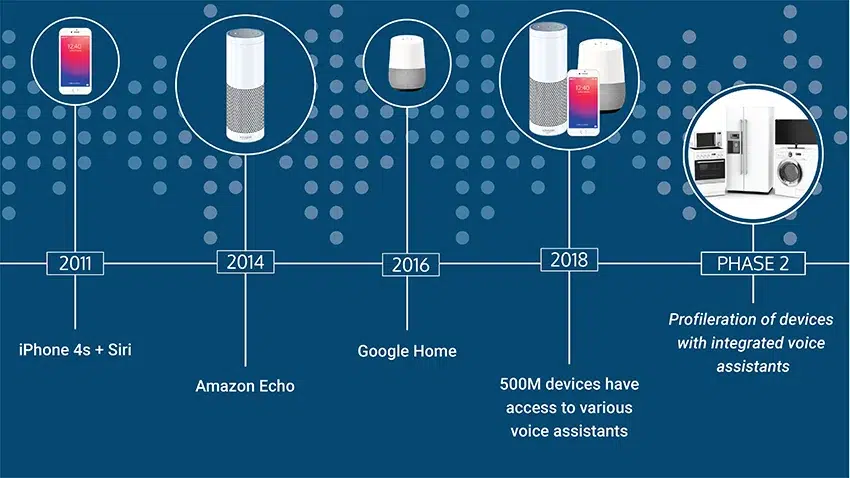
Voice search is becoming a more and more common way for people to quickly and easily access information as the world becomes more tech-driven. From straightforward inquiries to more in-depth research, voice assistants like Google’s Alexa, Siri, and others are transforming the way people discover their requirements. As a result, in order to optimize their content for Audio search, businesses, and content creators must adjust their strategies. In this blog post, we’ll talk about why it’s getting more and more popular and how to use SEO strategies specifically designed for earlier generations of text searches. We’ll also show you a few new tricks! By the end of this article, you should have a better understanding of how important it is to optimize the content of your website or app for Audio search so that users can use virtual assistants like Siri or Alexa with ease.
Introduction to Voice Search
Voice search is a technology that allows users to search the internet by speaking to a device, such as a smartphone or a smart speaker. With the increasing popularity of Sound assistants like Amazon Alexa, Google Assistant, and Apple Siri, Audio search has become an increasingly important aspect of digital marketing. As more and more people use Audio search to find information, products, and services, businesses need to adapt their marketing strategies to ensure they remain visible and accessible to their target audience. In this guide, we will explore the benefits of Audio search, how it works, and how businesses can optimize their content for Audio search to improve their online visibility and reach a wider audience.
The Rise of Voice Assistants: Alexa, Siri, and Google Assistant

Voice assistants, such as Amazon Alexa, Apple Siri, and Google Assistant, have revolutionized the way people interact with technology. These intelligent virtual assistants allow users to perform various tasks, such as setting reminders, playing music, and controlling smart home devices, using voice commands.
The popularity of voice assistants has skyrocketed in recent years, with an estimated 4.2 billion voice assistants in use globally. Audio search’s convenience, speed, and hands-free nature have fueled its rise as an increasingly popular alternative to traditional text-based search.
For businesses, the rise of voice assistants presents both opportunities and challenges. As more people turn to Audio search to find information, products, and services, businesses need to optimize their online content to ensure it remains visible and accessible. However, this requires a shift in the way businesses approach search engine optimization (SEO) and content creation, as the focus is no longer solely on keywords and text-based content.
In the following sections, we will explore the benefits of voice search for businesses, how it works, and how to optimize content for voice search.
Why Voice Search Matters for Your Business: Benefits and Opportunities

Voice search has become a critical aspect of digital marketing, and businesses that ignore its importance risk falling behind their competitors. Here are some of the key benefits and opportunities that voice search can offer businesses:
1. Increased visibility
Featured snippets or ‘position zero’ on search engine results pages (SERPs) often present voice search results, which can enhance your brand’s visibility and attract more traffic to your website.
2. Better user experience
Voice search offers a faster and more convenient way for users to find information, products, and services. Optimizing content for audio search can improve the user experience, leading to better customer satisfaction and loyalty.
3. More targeted traffic
Voice search queries are more conversational and long-tail, offering businesses the chance to reach a targeted audience and improve content relevance.
4. Competitive advantage
Optimizing content for Audio search can give a competitive advantage over slow-adapting businesses.
5. Improved brand recognition
Audio assistants often use the brand name when presenting search results, which can help increase brand recognition and awareness.
Optimizing Your Content for Voice Search: Best Practices and Strategies

Optimizing your content for this new format is essential as voice search grows. When conducting keyword research, you should take into consideration search trends and queries to ensure success. To write for a new type of search, use natural language and concise answers to provide quick information. Include question tags and direct responses to those questions to improve the effectiveness of your content. Last but not least, if you want Audio search optimization to produce the best results, you need to work toward writing in a conversational style that is similar to how people talk.
Challenges and Limitations of Voice Search: Addressing the Issues
Voice search is popular, but it has challenges and limitations. Some of the key issues that need to be addressed to improve the user experience and increase the adoption of voice search include:
1. Accuracy
One of the most significant challenges of voice search is accuracy. Voice recognition tech isn’t perfect, and many errors occur when trying to understand users. Users may become frustrated when they have to try different phrasing or repeat themselves to get the desired result.
2. Context
Another challenge of voice search is context. Voice assistants often struggle to understand the context of a user’s query, which can lead to incorrect responses. A voice assistant may list Italian restaurants but overlook user preferences or dietary restrictions.
3. Privacy
Privacy is a significant concern for many users of Audio search technology. Voice assistants are always listening, which means that they may be collecting data even when not actively in use. Privacy and data security issues may arise as a result of this.
4. User Experience
The user experience of Audio search is still evolving, and many users may find it confusing or difficult to use. This can lead to frustration and a lack of adoption of the technology.
The Future of Voice Search: Trends and Predictions for the Next Decade
In the coming decade, voice search technology is expected to rapidly evolve, with trends and predictions indicating an expansion of sound-enabled devices, increased personalization, integration with IoT, adoption by businesses, sound commerce, and improved multilingual capabilities. Experts predict a reach of 200 million units of smart speakers by 2020, and as voice recognition technology improves, virtual assistants will personalize and adapt to users’ preferences.
Voice search will integrate more with IoT devices for a seamless user experience. Businesses are increasingly using Audio search to interact with customers, and Sound commerce is set to become more widespread. As Sound recognition technology improves, it is also expected to become more accurate in recognizing different languages, opening up new opportunities for Audio search in multilingual markets.
Conclusion
In conclusion, The future of voice search looks promising, as the technology becomes more ubiquitous and integrated into our daily lives. As more voice-enabled devices enter the market and the technology improves, we can expect more personalized, efficient, and intuitive applications that help us access information, control our environment, and interact with businesses in innovative ways. As Audio search becomes mainstream, it will be interesting to see how businesses adapt and what new innovations emerge.
FAQ
Q. What impact will voice search have on search engine optimization (SEO)?
A. As users increasingly turn to voice search to find information online, it is anticipated that SEO will be significantly impacted by this trend. To optimize for voice search, businesses must focus on conversational long-tail keywords and concise, accurate answers.
Q. Will voice search replace text-based search?
A. Voice search’s widespread adoption is expected, but it is unlikely to completely replace text-based search. Text-based search is still important for certain types of queries, and many users still prefer to type their queries rather than speak them out loud.
Q. What are the privacy concerns with voice search technology?
A. Sound-enabled devices such as smart speakers, which constantly listen, raise privacy concerns associated with voice search technology, potentially allowing sensitive information to be overheard and shared. Users should be cautious about what they say around these devices and take steps to secure their devices and data.
Q. How will voice search be used in the future of e-commerce?
A. In the future of e-commerce, Audio search is expected to play a significant role. Consumers will be able to use Sound-enabled devices to search for products, make purchases, and track orders. Optimizing product listings for Audio search and providing a seamless user experience is crucial for businesses to succeed in Sound commerce.
Q. What industries will benefit the most from voice search technology?
A. Travel, hospitality, and healthcare industries, which heavily rely on information-based searches, are expected to benefit most from Audio search. With technological advancements, other industries are likely to adopt Audio search to improve the customer experience and increase efficiency.


